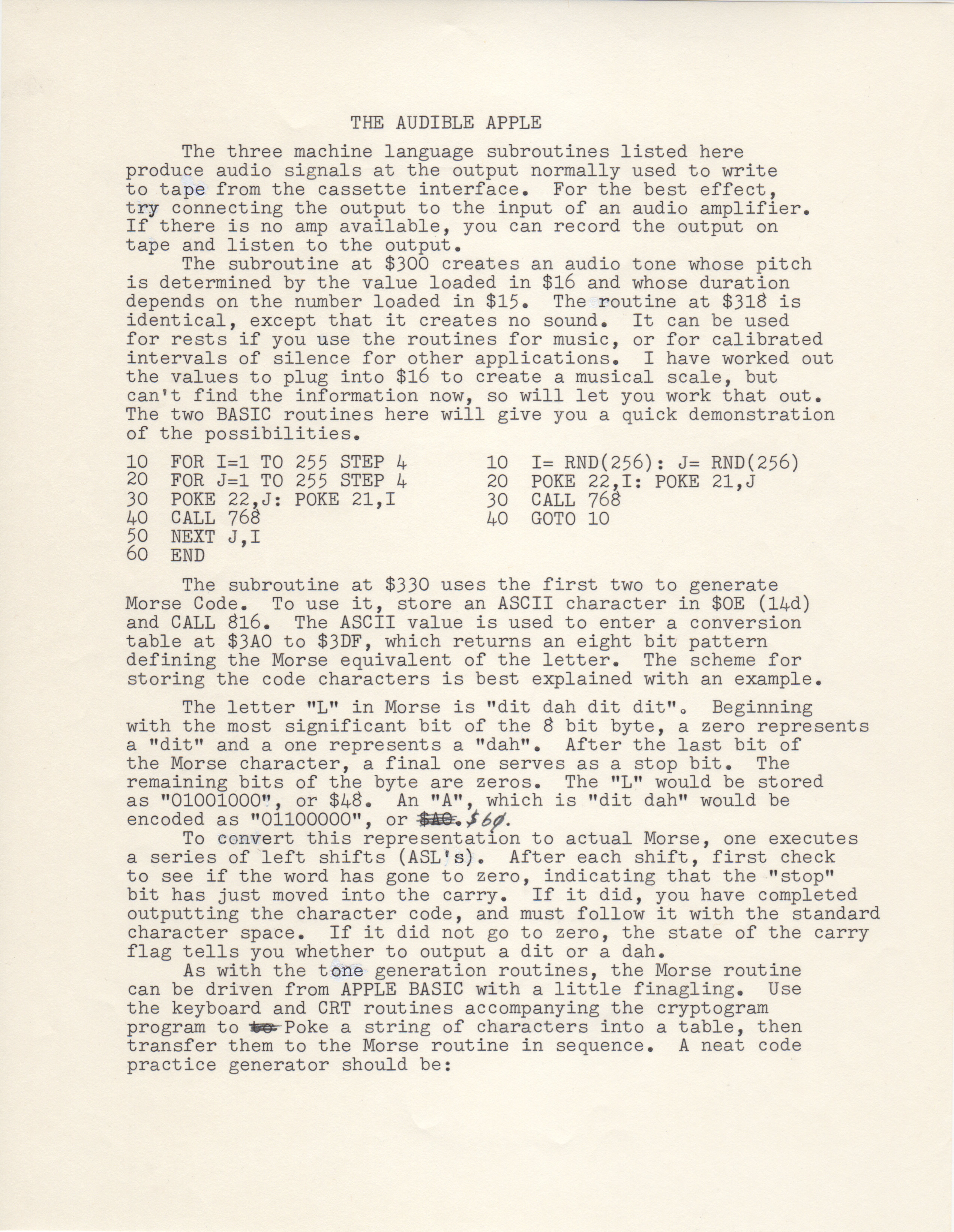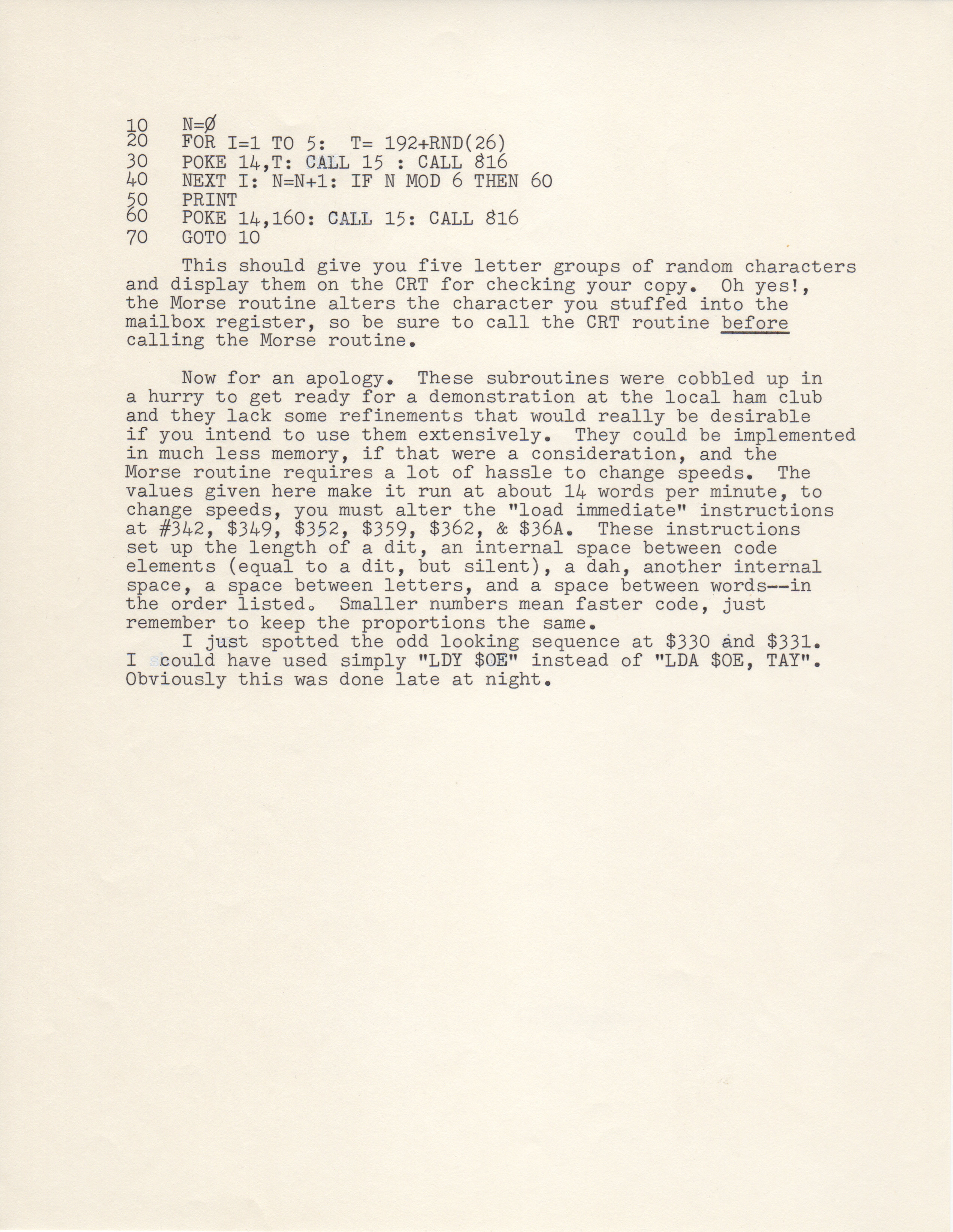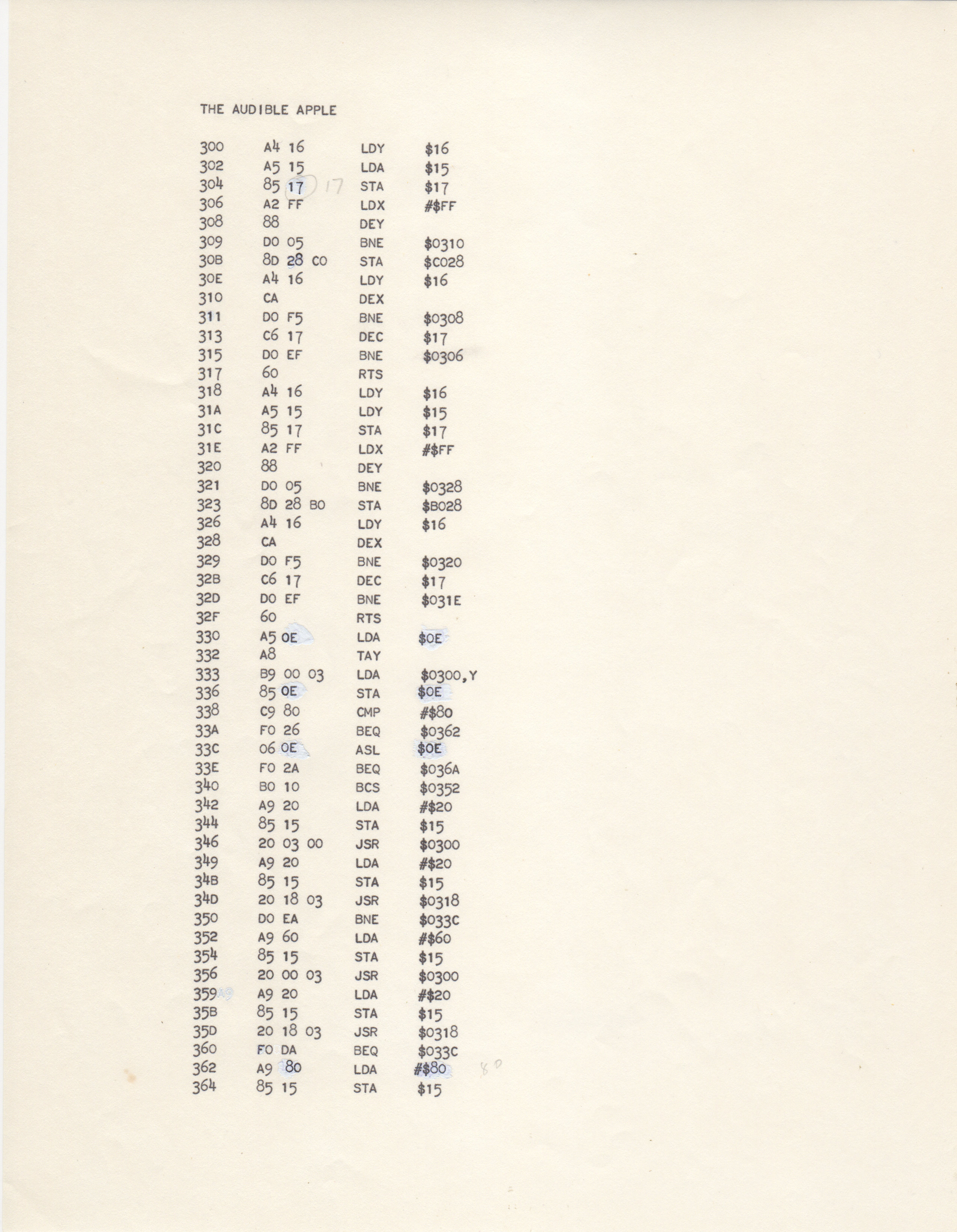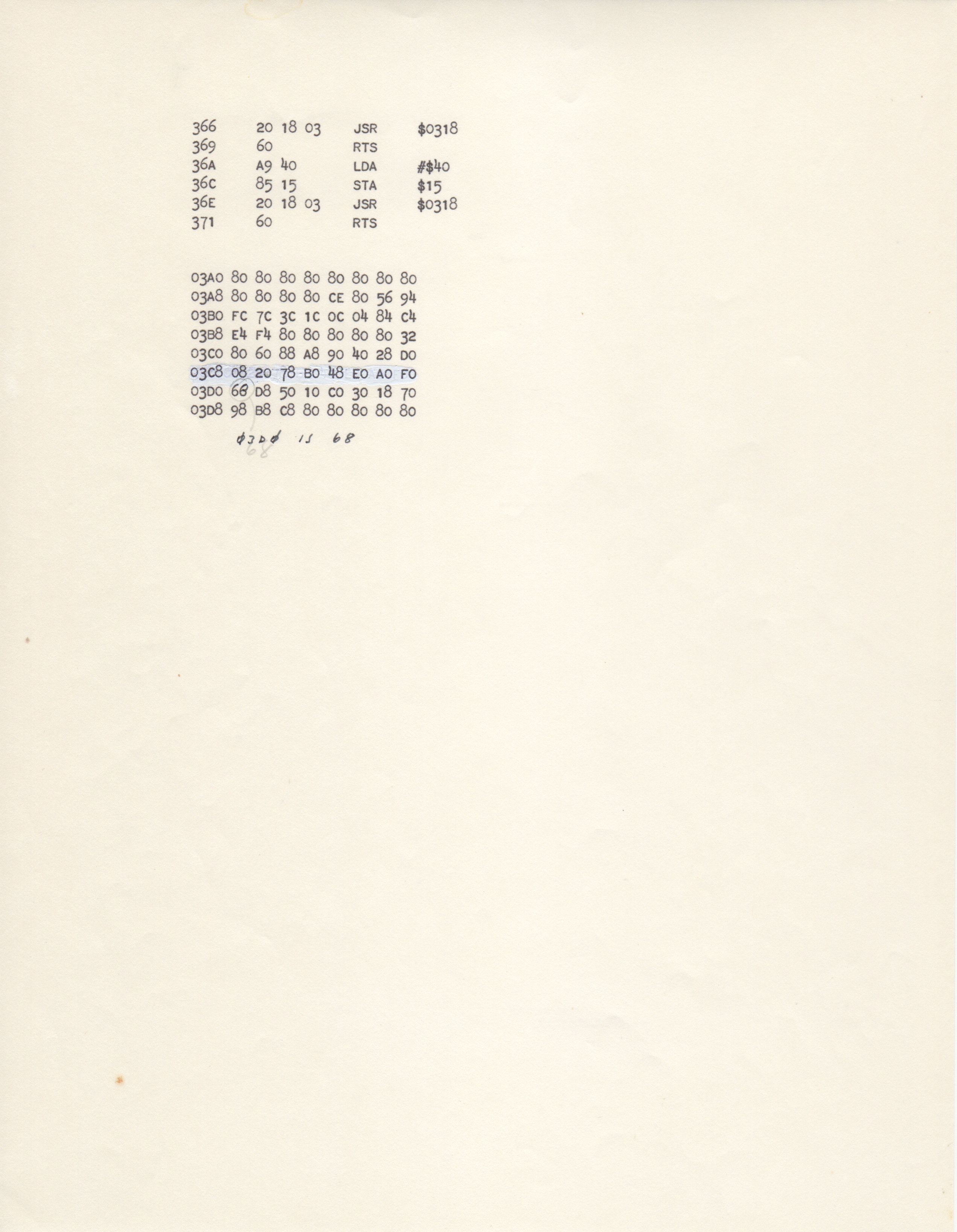The Audible Apple
The three machine language subroutines listed here
produce audio signals at the output normally used to write
to tape from the cassette interface. For the best effect,
try connecting the output to the input of an audio amplifier.
If there is no amp available, you can record the output on
tape and listen to the output.
The subroutine at $300 creats an audio tone whose pitch
is determined by the value loaded in $16 and whose duration
depends on the number loaded in $15. The routine at $318 is
identical, except that it creates no sounds. It can be used
for rests if you use the routines for music, or for calibrated
intervals of silence for other applications. I have worked out
the values to plug into $16 to create a musical scale, but
can't find the information now, so will let you work that out.
The two BASIC routines here will give you a quick demonstration
of the possibilities.
10 for I=1 to 255 step 4
20 FOR J=1 TO 255 STEP 4
30 POKE 22,J: POKE 21,I
40 CALL 768
50 NEXT J,I
60 END
10 I= RND(256): J= RND(256)
20 POKE 22,I: POKE 21,J
30 CALL 768
40 GOTO 10
The subroutine at $330 uses the first two to generate
Morse Code. To use it, store an ASCII character in $OE (14d)
and CALL 816. The ASCII value is used to enter a conversion
table at $#AO to $3DF, which returns an eight bit pattern
defining the Morse equivalent of the letter. The scheme for
storing the code characters is best explained with an example.
The letter "L" in Morse id "dit dah dit dit". Beginning
with the most significant bit of the 8 bit byte, a zero represents
a "dit" and a one represents a "dah". After the last bit of
the Morse character, a final one serves as a stop bit. The
remaining bits of the byte are zeros. The "L" would be stored
as "01001000", or $48. An "A", which is "dit dah" would be
encoded as "01100000", or $60.
To convert this representation to actual Morse, one executes
a series of left shifts (ASL's). After each shift, first check
to see if the word has gone to zero, indicating that the "stop"
bit has just moved into the carry. If it did, you have completed
outputting the character code, and must follow it with the standard
character space. If it did not go to zero, the state of the carry
flag tells you whether to output a dit or a dah.
As with the tone generation routines, the Morse routine
can be driven from APPLE BASIC with a lttle finagling. Use
the keyboard and CRT routines accompanying the cryptogram
program to Poke a string of characters into a table, then
transfer them to the Morse routine in sequence. A neat code
practice generator should be:
10 N=0
20 FOR I=1 TO 5: T= 192+RND(26)
30 POKE 14,T: CALL 15 : CALL 816
40 NEXT I: N=N+1: IF N MOD 6 THEN 60
50 PRINT
60 POKE 15,160: CALL 15: CALL 816
70 GOTO 10
This should give you five letter groups of random characters
and display them on the CRT for checking your copy. Oh yes!,
the Morse routine alters the character you stuffed into the
mailbox register, so be sure to call the CRT routine before
calling the Morse routine.
Now for an apology. These subroutines were cobbled up in
a hurry to get ready for a demonstration ath the local ham club
and they lack some refinements that would really be desirable
if you intend to use them extensively. They could be implemented
in much less memory, if that were a consideration, and the
Morse routine requires a lot of hassle to change speeds. The
values given here make it run at about 14 words per minute, to
change speeds, you must alter the "load immediate" instructions
at #342, $349, $352, $359, $362, & $36A. These instructions
set up the length of a dit, an internal space between code
elements (equal to a dit, but silent), a dah, another internal
space, a space between letters, and a space between words--in
the order listed. Smaller numbers mean faster code, just
remember to keep the proportions the same.
I just spotted the odd looking sequence at $330 and $331.
I could have used simply "LDY $OE" instead of "LDA $OE, TAY".
Obviously this was done late at night.
300 A4 16 LDY $16
302 A5 15 LDA $15
304 85 17 STA $17
306 A2 FF LDX #$FF
308 88 DEY
309 D0 05 BNE $0310
30B 80 28 CO STA $COZ8
30E A4 16 LDY $16
310 CA DEX
311 DO F5 BNE $0308
313 C6 17 DEC $17
315 D0 EF BNE $0306
317 60 RTS
318 A4 16 LDY $16
31A A5 15 LDY $15
31C 85 17 STA $17
31E A2 FF LDX #$FF
320 88 DEY
321 D0 O5 BNE $0328
323 80 28 BO STA $B028
326 A4 16 LDY $16
328 CA DEX
329 D0 F5 BNE $0320
32B C6 17 DEC $17
32D D0 EF BNE $0318
32F 60 RTS
330 A5 OE LDA $OE
332 A8 TAY
333 B9 00 03 LDA $0300,Y
336 85 OE STA $OE
338 C9 80 CMP #$80
33A FD 26 BEQ $0362
33C 06 OE ASL $OE
33E F0 2A BEQ $036A
340 80 10 BCS $0352
342 A9 20 LDA #$20
344 85 15 STA $15
346 20 03 00 JSR $0300
349 A9 20 LDA #$20
34B 85 15 STA $15
340 20 18 03 JSR $0318
350 00 EA BNE $033C
352 A9 60 LDA #$60
354 85 15 STA $15
356 20 00 03 JSR $0300
359 A9 20 LDA #$20
35B 85 15 STA $15
35D 20 18 03 JSR $0318
360 F0 DA BEQ $033C
362 A9 80 LDA #$80
364 85 15 STA $15
366 20 18 03 JSR $0318
369 60 RTS
36A A9 40 LDA #$40
36C 85 15 STA $15
36E 20 18 03 JSR $0318
371 60 RTS
03A0 80 80 80 80 80 80 80 80
03A8 80 80 80 80 CE 80 56 94
03B0 FC 7C 3C 1C 0C 0F 84 C4
03B8 E4 F4 80 80 80 80 80 32
03C0 80 60 88 A8 90 40 28 D0
03C8 08 20 78 B0 48 E0 A0 F0
03D0 68 D8 50 10 C0 30 18 70
03D8 98 B8 C8 80 80 80 80 80
03D0 is 68
- Printer-friendly version
- Log in or register to post comments




